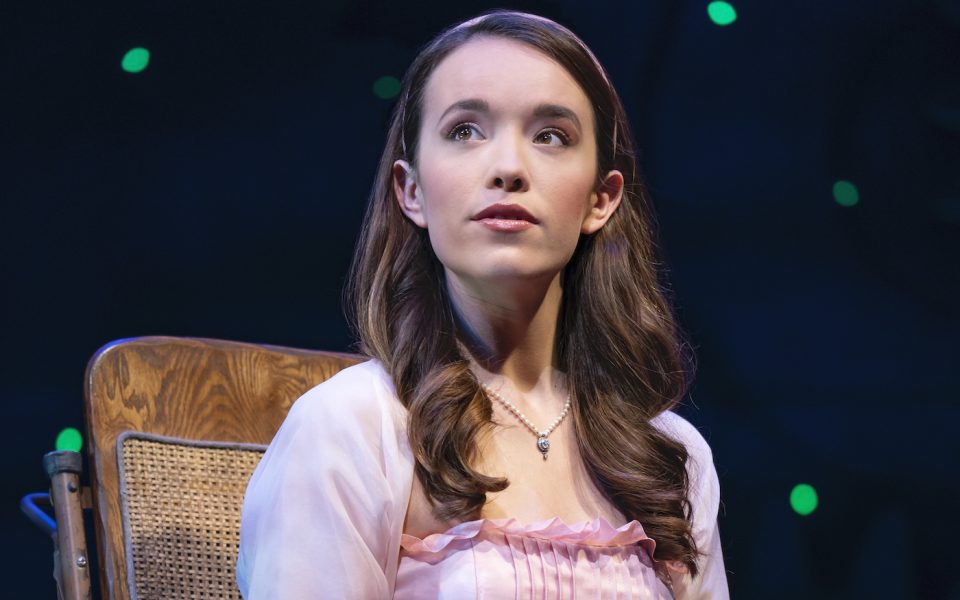Featured photo: Amanda Fallon Smith in the North American Tour of ‘Wicked’. (photo by Joan Marcus)
Amanda Fallon Smith is used to playing princesses.
With long brown hair and hazel eyes, Smith has played a myriad of Disney’s sweethearts including Jane from Tarzan, Ariel from The Little Mermaid and, of course, Belle from Beauty and the Beast. But a few years ago, Smith traded her regular damsel-in-distress characters for a quieter, slightly more wicked role.
Starting on Thursday, Smith will step into the role of Nessarose for the Tanger Center’s run of Wicked. It’s a role that she’s reprising after a year of waiting due to the pandemic.
“She’s been one of my favorite characters to play because her starting and ending points are so different mentally, emotionally and physically even,” says Smith. “It is a challenge to take myself there six nights a week, but it’s a really great challenge.”
Nessarose is the Wicked Witch of the East, or the younger sister of Elphaba, the Wicked Witch of West. Nessarose’s character was absent in the original Wizard of Oz by L. Frank Baum while Elphaba is nameless. Both characters get their own origin stories to become the central figures of Wicked, based on Gregory Maguire’s book, Wicked: The Life and Times of the Wicked Witch of the West which came out in 1995 and subsequently spawned the popular 2003 Broadway musical. Unlike many of the Disney characters that Smith has played in the past, she says she fell in love with Nessarose because of the complexity of her character and her tumultuous relationship with her sister.
“I always loved Nessa because she’s someone for whom everything she does, she does because she loves so hard,” Smith says. “She just loves so incredibly hard.”

Unlike classic Disney stories that often focus on love interests and pit female characters against one another for the attention of a man, Wicked focuses on the story between Elphaba and Glinda the Good Witch, exploring the complexity of female relationships whether they’re between sisters or friends.
“It really is a beautiful relationship between female characters and women, which you hardly ever see in entertainment,” Smith says. “This really is a love story between two friends.”
Smith has been in the industry for more than 10 years and first saw Wicked when she was in middle school.
“It was so magical to see everything from the sets to the costumes,” she says. “You really feel immersed in the world.”

Growing up on an ostrich farm in a rural Florida town, Smith says she wasn’t really given the opportunity to pursue theater until she was in high school.
“I was a later bloomer in the theater world,” Smith says. “I grew up in a rural area in Florida, and there were only 300 people in my class. The school didn’t even have a drama class.”
After seeing Wicked, Smith sang “Popular” in her middle school talent show, something for which her classmates made fun of her.
“No one got musical theater where I was from,” Smith says. “So I never really considered it until I grew up.”
When Smith was in eighth grade, her best friend dragged her to an audition for a youth production of Beauty and the Beast. She secured her first ever role as a singing knife and was hooked.
“I loved it,” Smith says. “It brought me out of my shell.”
By the time she was a senior in high school, she knew that she wanted to pursue a career in theater. Now, more than a decade later, Smith says that being able to be a part of a production of Wicked on Broadway feels like everything is coming “full circle.”
“Wicked was the first Broadway musical I ever saw,” Smith says. “I have sung the soundtrack for the last 18 years. So getting the call that I got the role, it didn’t feel real. I was in shock. Like, I’m a part of this huge machine; I get to be a part of this magic. That’s when it really hit me.”
In addition to it being one of the most popular Broadway musicals of all time, Smith says that the show takes on a new relevance these days because of its core messaging of understanding those who are different from us.
“All of the characters in the show, for the most part, are characters that were used as the pinnacle of evil in the original story,” Smith says. “But we really have to understand that they were misunderstood and that because of their circumstances, they ended up being portrayed as evil.”

Smith says with the hyperpolarization of the country with everything from politics to coronavirus, the show could be a way for people to try and empathize with others.
“In this really sensitive time you’re forced to choose sides, but all of these people are coming to see Wicked,” Smith says. “And it forces us to stop and look at people different from you and to experience empathy and look at someone and say, ‘Let me hear your side.’ It’s really about not judging someone on your first impression.”
Wicked runs at the Tanger Center from Oct. 6-24. Learn more at tangercenter.com.
Join the First Amendment Society, a membership that goes directly to funding TCB‘s newsroom.
We believe that reporting can save the world.
The TCB First Amendment Society recognizes the vital role of a free, unfettered press with a bundling of local experiences designed to build community, and unique engagements with our newsroom that will help you understand, and shape, local journalism’s critical role in uplifting the people in our cities.
All revenue goes directly into the newsroom as reporters’ salaries and freelance commissions.


[…] casualty of the pandemic. But it finally opened in October with the Broadway touring production of Wicked. The facility has already justified its existence by boosting downtown Greensboro’s economy and […]